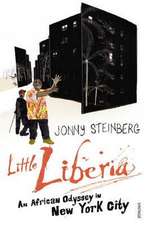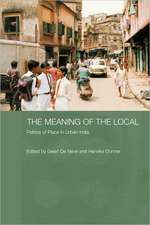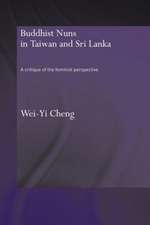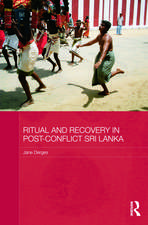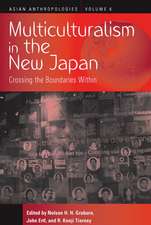Governing Ethnic Conflict: Consociation, Identity and the Price of Peace: Routledge Studies in Peace and Conflict Resolution
Autor Andrew Finlayen Limba Engleză Paperback – 19 dec 2011
The idea that conflicts are problems that have causes and therefore solutions rather than winners and losers has gained momentum since the end of the Cold War, and it has become more common for third party mediators acting in the name of liberal internationalism to promote the resolution of intra-state conflicts. These third-party peace makers appear to share lessons and expertise so that it is possible to speak of an emergent common technology of peace based around a controversial form of power-sharing known as consociation.
In this common technology of peace, the cause of conflict is understood to be competing ethno-national identities and the solution is to recognize these identities, and make them useful to government through power-sharing. Drawing on an analysis of the peace process in Ireland and the Dayton Accords in Bosnia Herzegovina, the book argues that the problem with consociational arrangements is not simply that they institutionalise ethnic division and privilege particular identities or groups, but, more importantly, that they close down the space for other ways of being. By specifying identity categories, consociational regimes create a residual, sink category, designated 'other'. These 'others' not only offer a challenge to prevailing ideas about identity but also stand in reproach to conventional wisdom regarding the management of conflict.
This book will be of much interest to students of conflict resolution, ethnic conflict, identity, and war and conflict studies in general.
Andrew Finlay is Lecturer in Sociology at Trinity College Dublin.
| Toate formatele și edițiile | Preț | Express |
|---|---|---|
| Paperback (1) | 410.16 lei 6-8 săpt. | |
| Taylor & Francis – 19 dec 2011 | 410.16 lei 6-8 săpt. | |
| Hardback (1) | 1049.36 lei 6-8 săpt. | |
| Taylor & Francis – 22 iul 2010 | 1049.36 lei 6-8 săpt. |
Din seria Routledge Studies in Peace and Conflict Resolution
-
 Preț: 314.01 lei
Preț: 314.01 lei -
 Preț: 296.65 lei
Preț: 296.65 lei -
 Preț: 137.59 lei
Preț: 137.59 lei -
 Preț: 301.63 lei
Preț: 301.63 lei -
 Preț: 324.91 lei
Preț: 324.91 lei -
 Preț: 231.06 lei
Preț: 231.06 lei -
 Preț: 466.45 lei
Preț: 466.45 lei - 25%
 Preț: 323.04 lei
Preț: 323.04 lei - 18%
 Preț: 1053.92 lei
Preț: 1053.92 lei -
 Preț: 385.54 lei
Preț: 385.54 lei - 18%
 Preț: 1117.43 lei
Preț: 1117.43 lei - 26%
 Preț: 821.82 lei
Preț: 821.82 lei - 18%
 Preț: 1165.73 lei
Preț: 1165.73 lei - 13%
 Preț: 337.39 lei
Preț: 337.39 lei - 18%
 Preț: 1168.37 lei
Preț: 1168.37 lei - 18%
 Preț: 1114.08 lei
Preț: 1114.08 lei - 18%
 Preț: 705.53 lei
Preț: 705.53 lei - 28%
 Preț: 822.34 lei
Preț: 822.34 lei - 18%
 Preț: 1049.36 lei
Preț: 1049.36 lei - 18%
 Preț: 1054.71 lei
Preț: 1054.71 lei - 18%
 Preț: 999.98 lei
Preț: 999.98 lei -
 Preț: 390.37 lei
Preț: 390.37 lei - 25%
 Preț: 853.43 lei
Preț: 853.43 lei - 30%
 Preț: 847.86 lei
Preț: 847.86 lei -
 Preț: 411.42 lei
Preț: 411.42 lei -
 Preț: 412.37 lei
Preț: 412.37 lei - 49%
 Preț: 543.52 lei
Preț: 543.52 lei - 17%
 Preț: 296.21 lei
Preț: 296.21 lei - 12%
 Preț: 299.52 lei
Preț: 299.52 lei - 28%
 Preț: 824.70 lei
Preț: 824.70 lei -
 Preț: 485.84 lei
Preț: 485.84 lei - 13%
 Preț: 295.49 lei
Preț: 295.49 lei - 18%
 Preț: 1166.80 lei
Preț: 1166.80 lei -
 Preț: 406.05 lei
Preț: 406.05 lei - 18%
 Preț: 1111.51 lei
Preț: 1111.51 lei - 18%
 Preț: 1164.44 lei
Preț: 1164.44 lei - 18%
 Preț: 1060.87 lei
Preț: 1060.87 lei -
 Preț: 381.00 lei
Preț: 381.00 lei - 26%
 Preț: 822.01 lei
Preț: 822.01 lei - 26%
 Preț: 848.22 lei
Preț: 848.22 lei
Preț: 410.16 lei
Nou
Puncte Express: 615
Preț estimativ în valută:
78.49€ • 81.65$ • 64.80£
78.49€ • 81.65$ • 64.80£
Carte tipărită la comandă
Livrare economică 14-28 aprilie
Preluare comenzi: 021 569.72.76
Specificații
ISBN-13: 9780415510110
ISBN-10: 0415510112
Pagini: 168
Dimensiuni: 138 x 216 x 9 mm
Greutate: 0.31 kg
Ediția:1
Editura: Taylor & Francis
Colecția Routledge
Seria Routledge Studies in Peace and Conflict Resolution
Locul publicării:Oxford, United Kingdom
ISBN-10: 0415510112
Pagini: 168
Dimensiuni: 138 x 216 x 9 mm
Greutate: 0.31 kg
Ediția:1
Editura: Taylor & Francis
Colecția Routledge
Seria Routledge Studies in Peace and Conflict Resolution
Locul publicării:Oxford, United Kingdom
Public țintă
Postgraduate, Professional, and UndergraduateCuprins
1. Introduction 2. Anthropology, Cultural Pluralism and Consociational Theory 3. Essentialism and the Reconciliation of the Liberal State to Ethnicity 4. Is Ethnopolitics a form of Biopolitics? 5. Consociationalism as a form of liberal governmentality: ‘single identity work’ versus community relations 6. Paradigm Shifts and the Production of ‘National Being’ 7. No Exit: Human Rights and the Priority of Ethnicity 8. ‘A Long Way To Get Very Little’: the Durability of Identity, Socialist Politics and Communal Discipline 9. Conclusion
Notă biografică
Andrew Finlay is Lecturer in Sociology at Trinity College, Dublin.
Recenzii
"Nowhere is the nexus between knowledge and power more starkly revealed than in conditions where, as the author rightly highlights, a line is drawn between the assumed ‘cause’ of conflict and its ‘solution’. Finlay usefully reveals the workings of this technology in a context that is not usually subjected to a Foucault-inspired analysis."
- Vivienne Jabri, Radical Philosophy, 168, July/August 2011
"Drawing upon the now vast literature on consociationalism and on two case studies - Northern Ireland and Bosnia and Herzegovina - Governing Ethnic Conflict is a valuable addition to the ever-growing literature on consociationalism and deserves a wide readership"
- Lawrence Cooley, Political Studies Review, 2011, Vol. 9
- Vivienne Jabri, Radical Philosophy, 168, July/August 2011
"Drawing upon the now vast literature on consociationalism and on two case studies - Northern Ireland and Bosnia and Herzegovina - Governing Ethnic Conflict is a valuable addition to the ever-growing literature on consociationalism and deserves a wide readership"
- Lawrence Cooley, Political Studies Review, 2011, Vol. 9
Descriere
This book offers an intellectual history of an emerging technology of peace and explains how the liberal state has come to endorse illiberal subjects and practices.

